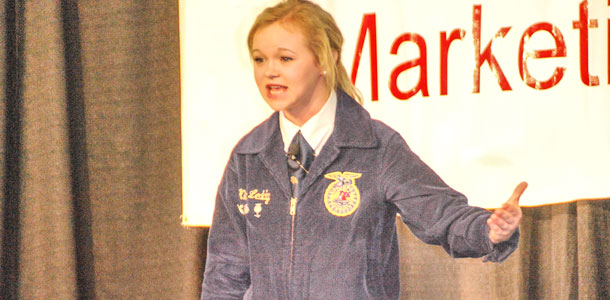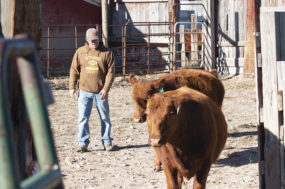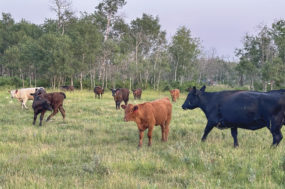Those grim numbers fueled her passion to speak up for agricultural technology – specifically genetic engineering. The Milbank, South Dakota, FFA senior says, “The fight over food needs to stop – and biotechnology is a key ingredient in solving global food security.”
For the past year, Leddy has gathered information focused on creating awareness for global hunger and the role biotechnology – specifically genetically modified organisms (GMOs) – can offer to advance food production and nutrition.
She has shared her plea, asking the public to support biotechnology efforts in agriculture via various public speaking platforms. Most recently, she competed in the public speaking contest at the 87th National FFA Convention held Oct. 29 - Nov. 1 in Louisville, Kentucky. From a field of 46 competitors – each representing their states – Leddy was named the top contestant with her impassioned speech advocating for genetic engineering.
In preparing her presentation, which was titled “Biotechnology: The Key Ingredient,” Leddy says she was motivated to promote the use of technology in agriculture because technology has become so prevalent in people’s lives.
“Almost everyone has a cell phone or uses a computer for school or work, and when someone is faced with a life-threatening disease, they hope that the best science and technology is being used for their treatment,” she points out.
However, when it comes to agriculture, she notes that the general public is less accepting of technology – which is costing lives.
Leddy shares another unfathomable statistic, saying, “I learned that each year, hunger kills more people worldwide than AIDS, malaria and tuberculosis combined, and hunger kills more people than all forms of cancer combined.”

The case for GMOs
Leddy wants people to realize that these grim statistics can be changed – namely with the use of GMO technology in crops and livestock.
“GMO corn and soybean genetics help farmers produce crops that are less susceptible to disease and pests and more tolerant of drought – this can result in higher yields, which means more food for the world,” Leddy says. She further explains that genetically modified seed offers the world a way to produce more food with less inputs like herbicides or to grow crops in regions of the U.S. – or other countries – where traditional seed may not survive in the dry conditions.
She is also excited about the potential genetic engineering offers to produce grain, meat and milk products in the future with an improved nutrient profile.
One current example being tested is Golden Rice, which is genetically modified to include beta-carotene that the human body then converts into vitamin A. In Third World countries where millions of adults and children suffer from vitamin A deficiency – which can result in blindness – one cup of Golden Rice could provide half of an adult’s daily vitamin A requirement.
Additional genetic engineering research is being explored to enhance traits and food nutrition – and even for human medical applications.
Of these examples, Leddy says, “From my research, I believe biotechnology in agriculture offers amazing promise for improving the survivability and health of people in the world. Now, we in agriculture need to help the public understand that GMOs are safe and are essential for solving the world’s hunger issue,” Leddy says.
Leddy says she believes most of the reluctance toward GMOs stems from lack of understanding about the technology. “People are concerned that this technology may have adverse effects to health or the environment. But the fact is that genetically modified crops have been grown in the United States for nearly 20 years, have been deemed safe through extensive research by the federal government and have been shown to have zero adverse effects on public health.”
To improve her own understanding of GMOs, Leddy visited with several university researchers and even toured a lab at SDSU and saw the “gene gun” that is used to transfer DNA in the genetic engineering process. She was so intrigued by the work being done that Leddy now plans to study biotechnology at SDSU when she enrolls next fall.
She also intends to study communications, because Leddy believes that is key to agriculture’s future as well. She concludes, “We have to be able to share and explain the story of agriculture. I believe that building awareness opens the door to understanding, and once people understand, they begin to accept.” ![]()
The first National FFA Public Speaking Contest was held in 1930 and has been held annually since. Contestants must deliver a six- to eight-minute speech about a current agriculture-related topic.
PHOTOS
PHOTO 1: Kiera Leddy is presented her award by National FFA Secretary Mitch Baker.
PHOTO 2: Kiera Leddy presented facts in favor of using biotechnology in food production to help resolve the world's hunger issue. She was named the National FFA Public Speaking winner at the 2014 National FFA Convention. Photos by Kindra Gordon.







